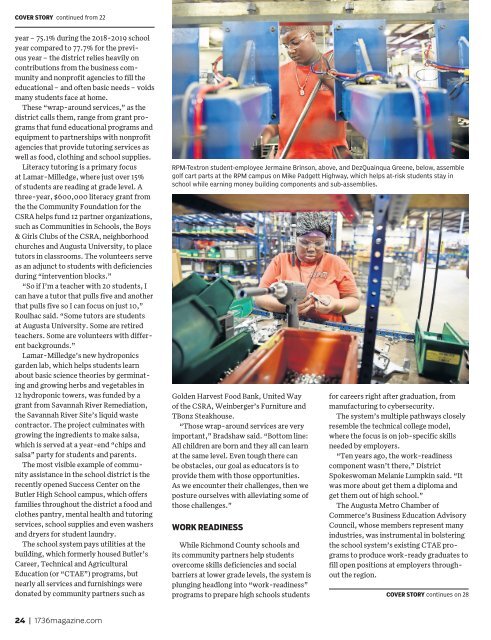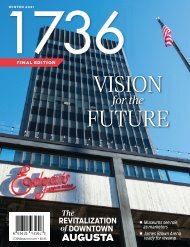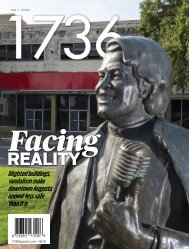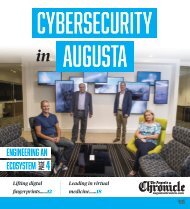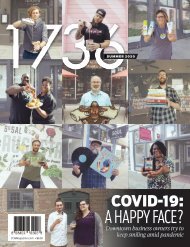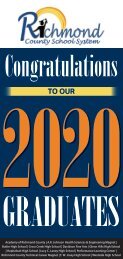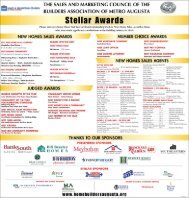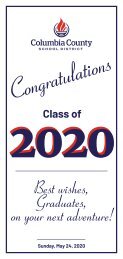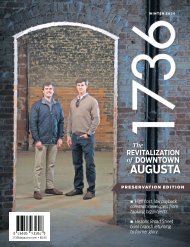Education Edition - 1736 Magazine, Fall 2019
- No tags were found...
You also want an ePaper? Increase the reach of your titles
YUMPU automatically turns print PDFs into web optimized ePapers that Google loves.
COVER STORY continued from 22<br />
year – 75.1% during the 2018-<strong>2019</strong> school<br />
year compared to 77.7% for the previous<br />
year – the district relies heavily on<br />
contributions from the business community<br />
and nonprofit agencies to fill the<br />
educational – and often basic needs – voids<br />
many students face at home.<br />
These “wrap-around services,” as the<br />
district calls them, range from grant programs<br />
that fund educational programs and<br />
equipment to partnerships with nonprofit<br />
agencies that provide tutoring services as<br />
well as food, clothing and school supplies.<br />
Literacy tutoring is a primary focus<br />
at Lamar-Milledge, where just over 15%<br />
of students are reading at grade level. A<br />
three-year, $600,000 literacy grant from<br />
the the Community Foundation for the<br />
CSRA helps fund 12 partner organizations,<br />
such as Communities in Schools, the Boys<br />
& Girls Clubs of the CSRA, neighborhood<br />
churches and Augusta University, to place<br />
tutors in classrooms. The volunteers serve<br />
as an adjunct to students with deficiencies<br />
during “intervention blocks.”<br />
“So if I’m a teacher with 20 students, I<br />
can have a tutor that pulls five and another<br />
that pulls five so I can focus on just 10,”<br />
Roulhac said. “Some tutors are students<br />
at Augusta University. Some are retired<br />
teachers. Some are volunteers with different<br />
backgrounds.”<br />
Lamar-Milledge’s new hydroponics<br />
garden lab, which helps students learn<br />
about basic science theories by germinating<br />
and growing herbs and vegetables in<br />
12 hydroponic towers, was funded by a<br />
grant from Savannah River Remediation,<br />
the Savannah River Site’s liquid waste<br />
contractor. The project culminates with<br />
growing the ingredients to make salsa,<br />
which is served at a year-end “chips and<br />
salsa” party for students and parents.<br />
The most visible example of community<br />
assistance in the school district is the<br />
recently opened Success Center on the<br />
Butler High School campus, which offers<br />
families throughout the district a food and<br />
clothes pantry, mental health and tutoring<br />
services, school supplies and even washers<br />
and dryers for student laundry.<br />
The school system pays utilities at the<br />
building, which formerly housed Butler’s<br />
Career, Technical and Agricultural<br />
<strong>Education</strong> (or “CTAE”) programs, but<br />
nearly all services and furnishings were<br />
donated by community partners such as<br />
RPM-Textron student-employee Jermaine Brinson, above, and DezQuainqua Greene, below, assemble<br />
golf cart parts at the RPM campus on Mike Padgett Highway, which helps at-risk students stay in<br />
school while earning money building components and sub-assemblies.<br />
Golden Harvest Food Bank, United Way<br />
of the CSRA, Weinberger’s Furniture and<br />
TBonz Steakhouse.<br />
“Those wrap-around services are very<br />
important,” Bradshaw said. “Bottom line:<br />
All children are born and they all can learn<br />
at the same level. Even tough there can<br />
be obstacles, our goal as educators is to<br />
provide them with those opportunities.<br />
As we encounter their challenges, then we<br />
posture ourselves with alleviating some of<br />
those challenges.”<br />
WORK READINESS<br />
While Richmond County schools and<br />
its community partners help students<br />
overcome skills deficiencies and social<br />
barriers at lower grade levels, the system is<br />
plunging headlong into “work-readiness”<br />
programs to prepare high schools students<br />
for careers right after graduation, from<br />
manufacturing to cybersecurity.<br />
The system’s multiple pathways closely<br />
resemble the technical college model,<br />
where the focus is on job-specific skills<br />
needed by employers.<br />
“Ten years ago, the work-readiness<br />
component wasn’t there,” District<br />
Spokeswoman Melanie Lumpkin said. “It<br />
was more about get them a diploma and<br />
get them out of high school.”<br />
The Augusta Metro Chamber of<br />
Commerce’s Business <strong>Education</strong> Advisory<br />
Council, whose members represent many<br />
industries, was instrumental in bolstering<br />
the school system’s existing CTAE programs<br />
to produce work-ready graduates to<br />
fill open positions at employers throughout<br />
the region.<br />
COVER STORY continues on 28<br />
24 | <strong>1736</strong>magazine.com<br />
1117_T_13_AM____.indd 24<br />
10/25/<strong>2019</strong> 11:54:48 AM


